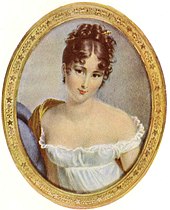Madame Récamier
| Movie | |
|---|---|
| Original title | Madame Récamier |
| Country of production | Germany |
| original language | German |
| Publishing year | 1920 |
| length | approx. 107 minutes |
| Rod | |
| Director | Joseph Delmont |
| script | Hans Gaus |
| production |
Georg Bluen Fern Andra for Saxon Art Film, Leipzig |
| camera | Emil Schünemann |
| occupation | |
| |
Madame Récamier is a German set and historical film set at the beginning of the Napoleonic era (around 1800) by Joseph Delmont with Fern Andra and Bernd Aldor in the leading roles.
action
The film sheds light on the vita and social activities of Julie Récamier , an important salon operator, in the early days of Napoléon Bonaparte . In their circles eminent personalities of society frequented, among them also declared opponents of the stormy Corsican. As a result, Madame Récamier had problems with state power on several occasions and was eventually even banished from Paris. The focus is primarily on Napoleon's early years, from his time as a lieutenant to his coronation as emperor. Madame Récamier's love for the French actor François-Joseph Talma has a special aspect .
Production notes
Madame Récamier , occasionally also referred to as The Great Talma Last Love , passed film censorship on July 31, 1920 and was banned from youth. The premiere took place as part of a demonstration on October 25, 1920 in Berlin's Marble House . The mass start was in December of the same year. The length of the strip was 2218 or (after minimal cuts) 2205 meters, divided into six acts.
Willi A. Herrmann designed the film structures .
To the historical person
Julie Récamier, née Bernard, married the banker Jacques-Rose Récamier at the age of fifteen and for a long time ran a salon in Paris, which was an important meeting place for society. Critics and opponents of Emperor Napoleon also met there . She maintained an extensive correspondence with important personalities of her time. Napoleon banished them from Paris in 1811. After his fall, she returned to Paris in 1814 and reopened her salon.
criticism
“Fern Andra and Bernd Aldor, two stars of film art, shine through the plot with their radiant skills and do not make it easy for the others to show themselves off. Nevertheless, the achievements of Ferdinand von Altens as Napoleon I and Miss Mund as Joséphine Beauharnais are to be fully recognized […] The piece has excellent qualities that cannot be described, you just have to let them work on you. Fern Andra has many beautiful moments, in some places she could have given the recamier more dignity. In contrast, Aldor was a stylish, almost genuine Talma. The presentation was adapted to French pomp and overall effective. "
Web links
- Madame Récamier in the Internet Movie Database (English)
- Madame Récamier at filmportal.de
